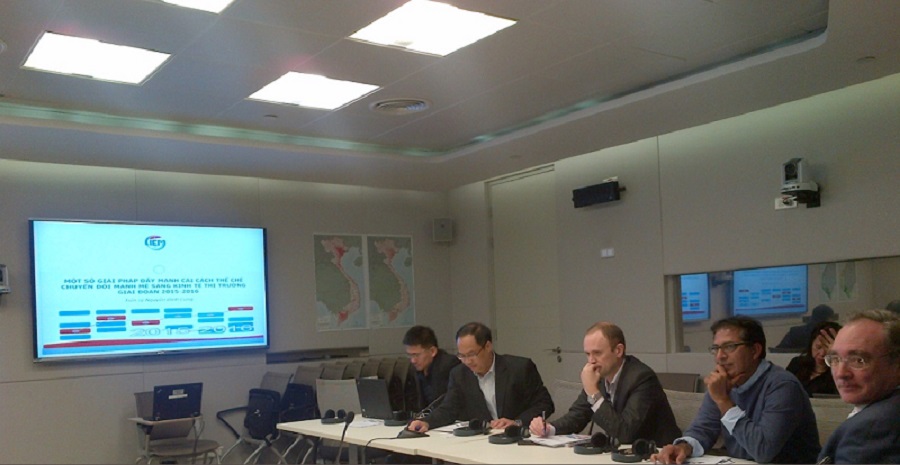[
20 April 2015] — There is a growing recognition including among the senior leaders of Vietnam about needs to fundamentally reform the country’s market institutions to enhance competitiveness and boost economic performance. The country’s 10 year development strategy 2011-20 already identified market institution reform as one of the three major breakthrough areas, together with the development of human resource and of the infrastructure system. However, progress to date has been slow, largely due to the lack of a feasible action program and detailed roadmaps for elaboration and realization of this vision.

The Ministry of Planning and Industry (MPI) has already formulated a comprehensive research program which will provide inputs for the documents for the XIIth Party Congress. The research program consists of the following six areas: (i) report on reform of the mindset for development; (ii) institutional reforms to promote a full-fledged market economy; (iii) financial sector reform for improved resource mobilization and allocation; (iv) improving service delivery (e.g., health, education, training, science and technology etc.) using market mechanisms; (v) decentralization between central and local governments to develop local and regional economic development; and (vi) formulation of the Socio-economic Development Report for the 12th Congress.
Market institutional reform also features prominently in the preparation of the Vietnam 2035 Report. This is a strategic document which aims to set out the vision for Vietnam by 2035 and lays out the policy options to achieve this vision. Vietnam 2035 Report is expected to have three pillars: sustainable long-term growth, inclusiveness and governance and rule of law. The role of the state in Vietnam’s market economy will be one chapter in the governance pillar, which is expected to identify the institutional binding constraints and elaborate policy actions to address them so that Vietnam can achieve its 2035 vision.
The Government has already set up a task team led by CIEM which will prepare a report on market institutional reform for the Vienam Development Partnership Forum (VDPF) meeting. The MPI has requested support from the World Bank for all these three inter-related activities mentioned above (the research project, Vietnam 2035 Report and VDPF Report). As part of the response, DFAT and the World Bank have set up a Bank-executed Trust Fund (BETF) which aims to make contribution to improvement of the enabling nature of the state in Vietnam’s market economy. The BETF has two components which include: (i) research component; and (ii) consultation and Dissemination Component.
Economica team of experts were recruited by the World Bank to support the implementation of the BETF and facilitate the implementation of the BETF by formulation of a detailed work plan for the BETF and a mechanism for monitoring the immediate outcomes of the BETF.
Especially, the team support the GoV in preparation of its VDPF report for market institutional reform which is presented at the VDPF in December 2014. A report on SOE reform and preferential treatment to the sector is also prepared to provide inputs to the VN2035 Report. These report are to be made available to the public in mid-2015.
In addition to these, Ecconomica team also contribute to an effective coordination between the VN2035 local team and the BETF team in effective utilization of the BETF in-depth studies as inputs for the VN2035 Report.


 Lao Cai District Competiveness Index (DCI) Report Completed (18/03/2015)
Lao Cai District Competiveness Index (DCI) Report Completed (18/03/2015)
 Final evaluations of two ILO projects on social and unemployment insurance (21/01/2015)
Final evaluations of two ILO projects on social and unemployment insurance (21/01/2015)
 Execution of ADB TA for Strengthening Microfinance Sector (08/12/2014)
Execution of ADB TA for Strengthening Microfinance Sector (08/12/2014)
 Development of the M&E Framework for the MPI - WB Inclusive Innovation Project (24/08/2014)
Development of the M&E Framework for the MPI - WB Inclusive Innovation Project (24/08/2014)
 Support to DICA Myanmar in Process Mapping, Reforms and Capacity Building (24/08/2014)
Support to DICA Myanmar in Process Mapping, Reforms and Capacity Building (24/08/2014)
 Documentation of the “Developing Business with Rural Poor in Cao Bang” (22/06/2014)
Documentation of the “Developing Business with Rural Poor in Cao Bang” (22/06/2014)
 Effective Business Associations for Dynamic and Inclusive Growth in Vietnam (05/05/2014)
Effective Business Associations for Dynamic and Inclusive Growth in Vietnam (05/05/2014)
 Exchange Forum with ECOSOCC from the Kingdom of Cambodia on RIA (05/04/2014)
Exchange Forum with ECOSOCC from the Kingdom of Cambodia on RIA (05/04/2014)
 Implementation of a Study on PCI and Economic Governance in the Northern Upland (23/03/2014)
Implementation of a Study on PCI and Economic Governance in the Northern Upland (23/03/2014)
 Facilitating Exchange Learning for Reps of the Nepalese Government to VN (06/02/2014)
Facilitating Exchange Learning for Reps of the Nepalese Government to VN (06/02/2014)